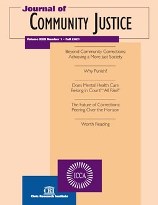Exploring the Risk-Dosage Relationship in Offenders Classified as Neurotic
Author: Kimberly Gentry Sperber.; Matthew D. Makarios.; Edward J. Latessa.
Source: Volume 27, Number 02, Winter 2018 , pp.9-13(5)

< previous article |next article > |return to table of contents
Abstract:
Research confirms that correctional practitioners should differentiate services by offender risk so that higher risk offenders receive more intensive services than lower risk offenders. Research also confirms that practitioners should use cognitive behavioral interventions because they have consistently demonstrated a positive impact on recidivism for offenders in the aggregate. However, some research suggests that offenders with certain personality traits—most notably, those classified as neurotic—are higher risk for reoffending and may not fare well in cognitive behavioral programs. If this is true, increasing cognitive behavioral dosage for high-risk neurotic offenders may have a detrimental impact on recidivism. Consequently, this study examines the risk-dosage relationship in a sample of 257 neurotic male offenders successfully discharged from a community-based correctional facility. Results support providing higher levels of dosage to higher risk neurotic male offenders and are consistent with previous dosage studies with general population samples.Keywords: Risk principle, offender mental health, treatment dosage, recidivism, neurotic offender
Affiliations:
1: Talbert House; 2: University of Northern Iowa; 3: University of Cincinnati.